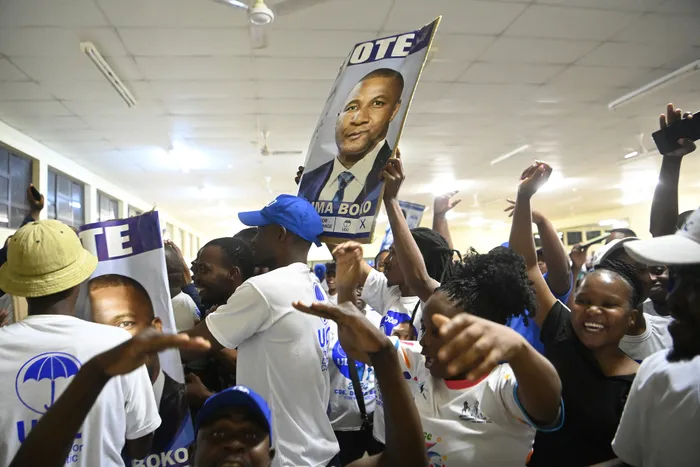Winds of change blowing across Southern Africa a warning to SADC

Umbrella for Democratic Change (UDC) supporters cheer at a counting centre in Gaborone on October 31, 2024. The government of Botswana’s new President Duma Boko, who has worked with opposition parties before in Zimbabwe, Angola and Mozambique will now have a listening ear in the SADC region, says the writer. Picture: Monirul Bhuiyan / AFP.
Dr. Sizo Nkala
THE Umbrella for Democratic Change (UDC) staged a major electoral upset as it emerged victorious in Botswana’s October 30 general elections, dislodging the Botswana Democratic Party (BDP) which had governed the Southern African country since it attained its independence in 1966.
The UDC, led by Duma Noko, clinched 36 out of the 61 parliamentary seats thus achieving the required majority to form a government. The BDP only managed 4 seats, marking its worst electoral performance. The Botswana Congress Party (BCP) came a distant second with 15 seats while the Ian Khama-backed new kid on the block, the Botswana Patriotic Front (BPF) managed to get 5 seats.
The BDP’s failure to address the economic crisis which saw unemployment rising to 28%, allegations of corruption in government, President Masisi’s fallout with his predecessor, Ian Khama, and a disillusioned youth contributed to its electoral defeat. In a rare spectacle in African politics, the former president Mokgweetsi Masisi swiftly and graciously conceded defeat and committed to cooperating with the incoming president Duma Boko for a smooth and peaceful transfer of power.
Botswana’s election results were the second time in a space of 5 months that a former liberation movement lost its majority in Southern Africa. This after South Africa’s African National Congress (ANC) saw its electoral support dip to 40% and losing its parliamentary majority for the first time in 30 years in the May 29 elections. The ANC was forced to form a Government of National Unity (GNU) to co-govern with other parties.
This certainly indicates that Southern Africa, a region whose governments are mostly dominated by former liberation movements, may be fast approaching a post-liberation movement era. Zambia and Malawi dislodged their liberation movements – the United National Independence Party (UNIP) and the Malawi Congress Party (MCP) respectively – from power in the early 1990s. Although liberation movements in Zimbabwe (Zimbabwe African National Union-Patriotic Front), Namibia (the South-West African People’s Organization), Mozambique (Mozambique Liberation Front) and Angola (People’s Movement for the Liberation of Angola) still hold the reins in their respective countries, their stranglehold in the region is loosening.
In countries like Zimbabwe, Mozambique and Angola, the Zanu-PF, Frelimo, and the MPLA still hold on to power largely because they have not been willing to subject themselves to free, fair and credible democratic elections. In stark contrast with Botswana, Mozambique is currently experiencing post-election violence as the opposition parties have disputed and rejected the outcome of the October 9 elections which handed Frelimo a landslide majority.
Botswana’s elections carry important implications for the Southern African region.
Firstly, it may have bolstered and inspired opposition parties in countries like Zimbabwe, Angola, Namibia and Mozambique by demonstrating that it is possible to defeat entrenched liberation parties in elections. Botswana serves as an example that the mobilization of the youth can make a difference in national elections.
The newfound youth activism in Botswana which was displayed on social media platforms may spread to the youth of the neighbouring countries and inspire them to participate in their countries’ political processes. The contagious effect of Botswana’s election miracle will undergo an immediate test when Namibia, a country still ruled by a former liberation movement, holds its elections on November 27.
Secondly, Botswana’s election outcome will add a new voice at the regional level in the Southern African Development Community (SADC). Having been dominated by governments controlled by liberation movements since its inception, the SADC has failed to hold some of its member states accountable in cases of alleged human rights abuses or the flouting of democratic processes.
Connected by camaraderie forged during the anti-colonial struggles, the liberation movement governments have not hesitated to protect and support each other often to the detriment of democratic principles. Zimbabwe’s Zanu-PF actively supported Botswana’s BDP in the recent elections. Zimbabwean President Emmerson Mnangagwa, who is the current SADC Chair, was quick to congratulate Frelimo on its electoral victory despite the grievances of the opposition.
We have already seen how the ascendance of new governments in countries formerly ruled by liberation movements can impact the dynamics of regional politics.
For example, under the leadership of Zambia’s President Hakainde Hichilema, someone with no connection to the liberation struggle, the SADC Electoral Observer Mission (SADC EOM) was, for the first time in its history, critical of some aspects of the electoral processes in Zimbabwe’s August 2023 elections.
Zanu-PF did not mince its words in its disapproval of the SADC EOM report even ludicrously accusing the chairperson of the EOM of working with imperialist agents. Further, the ANC’s biggest partner in the GNU, the Democratic Alliance (DA) demanded that the August 2024 SADC Summit be moved from Zimbabwe on account of the Zimbabwean government’s alleged human rights abuse.
As such, in the government of Botswana’s new President Duma Boko, who has worked with opposition parties in the region before, opposition parties in Zimbabwe, Angola and Mozambique will now have a listening ear in the SADC. The days of SADC being a club of former liberation movements readily casting a blind eye on the appalling human rights records of some of them may be numbered.
* Dr. Sizo Nkala is a Research Fellow at the University of Johannesburg’s Centre for Africa-China Studies.
** The views expressed in this article do not necessarily reflect the views of The African.